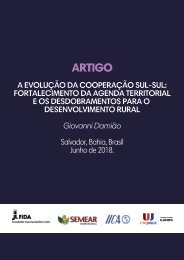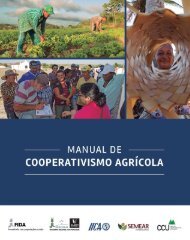The Evolution of South-South Cooperation
Since the Bandung Conference in 1955, the countries of the South have organized themselves in a structured way to achieve better levels of development. This article aims to present the evolution and recent trends of South-South Cooperation, showing how the historical dynamics have led the United Nations and its agencies to adopt a territorial approach, with a strong appeal to mobilize local actors. Allied to this, the increase of the independence of the actors that, with autonomy, manage to dialogue and conduct initiatives of cooperation outside the formal sphere of the central government. This article also aims to present rural development, agriculture and food security as essential factors for the development that since 1978, with BAPA (Buenos Aires Plan of Action), is one of the main thematic lines presented when it comes to the development of the southern agenda. Alongside this, the challenges presented by the prioritization of market dynamics in the face of social development, and how some of the multilateral agencies have worked to promote the facilitation of South-South cooperation and empowerment of minorities, in the achievement of governance as a strategy for endogenous and localized development
Since the Bandung Conference in 1955, the countries of the South have organized themselves in a structured way to achieve better levels of development. This article aims to present the evolution and recent trends of South-South Cooperation, showing how the historical dynamics have led the United Nations and its agencies to adopt a territorial approach, with a strong appeal to mobilize local actors.
Allied to this, the increase of the independence of the actors that, with autonomy, manage to dialogue and conduct initiatives of cooperation outside the formal sphere of the central government. This article also aims to present rural development, agriculture and food security as essential factors for the development that since 1978, with BAPA (Buenos Aires Plan of Action), is one of the main thematic lines presented when it comes to the development of the southern agenda. Alongside this, the challenges presented by the prioritization of market dynamics in the face of social development, and how some of the multilateral agencies have worked to promote the facilitation of South-South cooperation and empowerment of minorities, in the achievement of governance as a strategy for endogenous and localized development
Create successful ePaper yourself
Turn your PDF publications into a flip-book with our unique Google optimized e-Paper software.
stems from the need for engagement between the actors:<br />
One <strong>of</strong> the main characteristics <strong>of</strong> this approach is that it brings together the local<br />
government, the private sector, nonpr<strong>of</strong>it organizations and local communities,<br />
encouraging them to make better use <strong>of</strong> existing resources and <strong>of</strong> the potential <strong>of</strong><br />
the location. Local Economic and Social Development aims at improving the local<br />
economic conditions and, therefore, at achieving better quality <strong>of</strong> life. This is a<br />
"bottom-up" approach that values local, public and private actors responsible for<br />
investment and associated processes (MORAIS, apud. Amorim and Lagarde, 2013,<br />
p. 20).<br />
According to Karl Schab, CEO <strong>of</strong> the World Economic Forum, in an interview in 2017 with<br />
the Milênio newspaper, economic development cannot be achieved without social development.<br />
<strong>The</strong>refore, strategies for inclusion <strong>of</strong> minorities gain more strength to promote integrated initiatives<br />
that dialogue with all publics. Thus, the IFAD and the other agencies engaged in international<br />
cooperation seek not only to support the development <strong>of</strong> minorities, but, especially, to develop<br />
governance strategies so they can propose and participate in the process <strong>of</strong> construction <strong>of</strong> their<br />
own development, and consequently support the other units in the political <strong>South</strong>, in the path <strong>of</strong><br />
<strong>South</strong>-<strong>South</strong> cooperation to follow in the same direction. As a result <strong>of</strong> the PVSA, many <strong>of</strong> the<br />
benefited cooperatives and associations are invited to include women in the decision-making<br />
process, in order to make them co-participants in the development.<br />
In the Viva o Semiárido Project, a noteworthy example is the Association <strong>of</strong> Sheep and Goat<br />
Breeders <strong>of</strong> Betânia do Piauí (ASCOBETÂNIA), which, among the associations, cooperatives, and<br />
communities covered by the program, shows concern for presenting the number <strong>of</strong> women who<br />
are benefited by the project. <strong>The</strong> challenge faced by women to occupy the spaces is evident,<br />
because, according to data from 2017, among the 136 members <strong>of</strong> ASCOBETÂNIA, 115 are men,<br />
9 are women, and 12 are youths. Efforts are being made to facilitate the inclusion; however, the<br />
social and cultural structures that relegate them to a secondary place are still quite present. Thus,<br />
with respect to the capacity-building process through international cooperation there is also<br />
implicitly the breaking <strong>of</strong> paradigms about development with the understanding that the actors<br />
that seek the benefit should guide their own development, and then promote the dissemination <strong>of</strong><br />
good practices to States that share similar problems. <strong>The</strong> similarity <strong>of</strong> these problems stems mostly<br />
from the historical processes <strong>of</strong> colonial spoliation, and maintenance <strong>of</strong> social structures and<br />
disparities that are still present in many countries <strong>of</strong> the <strong>South</strong>. <strong>The</strong>n, through an existing historical<br />
17




